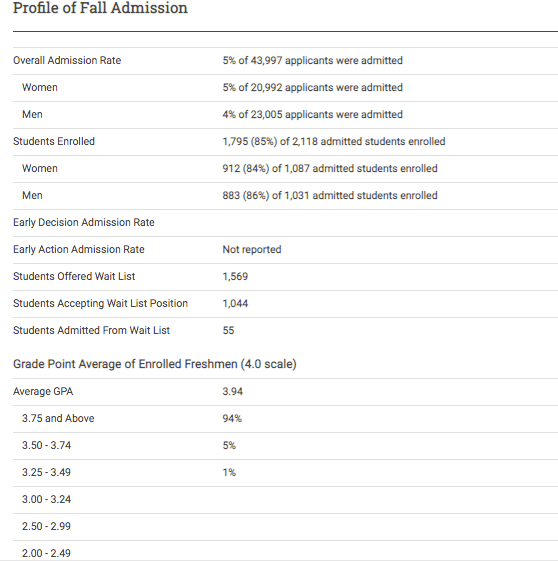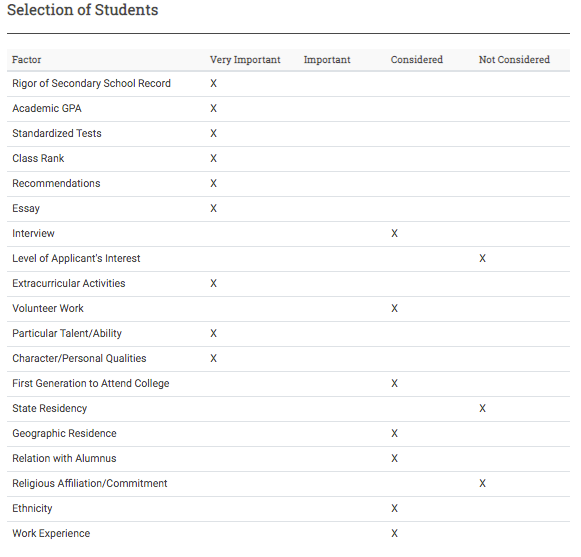What is a competitive college GPA?
What is the GPA needed for Stanford? What is the GPA needed for Yale, or the GPA needed for MIT?
What are the best ECs for college?
What are Stanford's requirements for admission? What are the UC admissions requirements for each school?
What do colleges look for in students? What do Ivy League schools look for? What are the college admissions requirements for my dream school?
How do colleges decide who gets in?!?!
These are all great questions!
And answering them may seem overwhelming at first.
A lot of people on the Internet claim to miraculously have all the answers. Somehow, they've synthesized the collective knowledge, opinions, and beliefs of thousands of admissions officers across the US.
I, however, am unfortunately not a mind-reader -- I will openly admit that I know the answer to very few of these questions. Yes, I can tell you generally what ECs are preferred, how to write a great essay, what you should be focusing on in high school, and specifics for my alma mater (Harvard).
But to immediately know how an MIT admissions officer I've never met will weigh your specific community service experience against working a part-time job? Impossible (unless of course you're one of these mind-reading college consultants found around the Internet).
Does that mean there's no way to know the answers to these questions?
No.
In fact, there's an even better solution.
What if you could directly ask your dream college how it decides who'll be admitted?
Amazingly, you can.
You just need to know where to look.
That's because the federal government mandates that accredited colleges report this information every year to the National Center for Education Statistics.
This data is conveniently collected by College Data into a neat admissions database. Thus, I’ve pulled a few interesting examples for you below (Stanford, Yale, MIT, and UC Berkeley).
These are the factors that Stanford uses to grade applicants, as well as their relative importance:

Collectively, this table (as well as the ones below) show that a much wider variety of factors beyond just GPA (essays, extracurriculars, rec letters, etc.) go into your admissions decision, and how each will be weighted differently by different colleges.
These are MIT’s preferences:

And here is the corresponding chart for UC Berkeley :

As you can see, there are a ton of factors that influence your admissions decision.
Additionally, each school has its own unique culture which will be reflected in how it preferentially evaluates different candidates.
Finally, here is the relevant chart for Yale :

It's important to make sure that in each of your applications to these schools, you highlight the elements of your application that correspond to those most prioritized by that school.
An amusing anecdote from Microsoft co-founder Bill Gates perfectly illustrates this point:
As a senior, he [Bill Gates] applied only to three colleges — Harvard, Yale, and Princeton — and he took different approaches to each.
"I was born to apply for college," he said, fully aware of his ability to ace meritocratic processes.
For Yale he cast himself as an aspiring political type and emphasized the month he had spent in Washington as a congressional page. For Princeton, he focused only on his desire to be a computer engineer. And for Harvard, he said his passion was math. He had also considered MIT, but at the last moment blew off the interview to play pinball.
He was accepted to all three, and chose Harvard. "There are going to be some guys at Harvard who are smarter than you,"" Allen warned him. Gates replied, "No way! No way!"
The College Data website also lays out the requirements and benchmarks for admission to each school.
Here are the admission statistics of students admitted to Stanford :

If you fit the profile of the typical student admitted to the school you want to go to, that's amazing news -- Congrats! You now just need to polish up the rest of your application.
If perfecting your essays is something still on your bucket list, you've come to the right place.
If you want direct 1-on-1 mentorship from top Ivy League students, or a review of your materials before you press submit, consider signing up for a free 20-minute consultation or learn more about how we can help you here .


